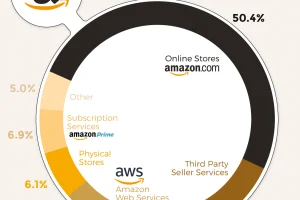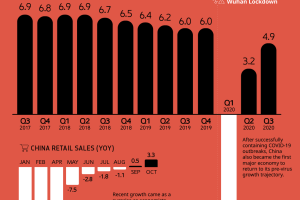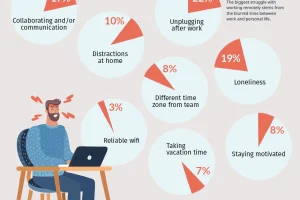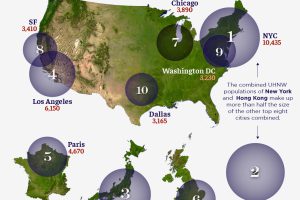The Briefing
- In every single country surveyed, the majority of respondents believed a world war could break out in coming years
- Australia was the most pessimistic, and Japan was the most optimistic
Which Countries Believe WWIII Could be Coming?
After a pandemic, rampant inflation, a faltering global economy, and geopolitical flare-ups, it’s no surprise that people have a souring outlook on the future.
Even so, the results of this recent survey by Ipsos are eyebrow raising. In all 33 countries where polling took place, the majority of respondents said they believe a world war on the scale of WWI and WWII could break out between global superpowers in coming years.
Here’s a look at how various countries felt about the possibility of an impending global conflict:
| Country | % somewhat/strongly agree | Change from 2021 (p.p.) |
|---|---|---|
| 🇦🇺 Australia | 81% | +8 |
| 🇮🇪 Ireland | 80% | n/a |
| 🇲🇽 Mexico | 80% | +8 |
| 🇵🇪 Peru | 80% | +3 |
| 🇮🇳 India | 79% | +3 |
| 🇨🇱 Chile | 78% | +3 |
| 🇨🇴 Colombia | 78% | +1 |
| 🇲🇾 Malaysia | 78% | +4 |
| 🇹🇭 Thailand | 78% | n/a |
| 🇧🇪 Belgium | 77% | +18 |
| 🇷🇴 Romania | 77% | n/a |
| 🇨🇦 Canada | 76% | +13 |
| 🇺🇸 United States | 76% | +6 |
| 🇫🇷 France | 75% | +16 |
| 🇬🇧 Great Britain | 75% | +19 |
| 🇳🇱 Netherlands | 75% | +15 |
| 🇿🇦 South Africa | 75% | +3 |
| 🇪🇸 Spain | 75% | +5 |
| 🇦🇪 UAE | 75% | n/a |
| 🇸🇦 Saudi Arabia | 74% | +12 |
| Global Country Average | 73% | +10 |
| 🇧🇷 Brazil | 72% | +10 |
| 🇦🇷 Argentina | 71% | +5 |
| 🇹🇷 Turkey | 71% | +8 |
| 🇵🇱 Poland | 70% | +4 |
| 🇺🇦 Ukraine | 70% | n/a |
| 🇰🇷 South Korea | 69% | +17 |
| 🇭🇺 Hungary | 67% | +10 |
| 🇨🇳 China | 64% | +6 |
| 🇮🇹 Italy | 64% | +19 |
| 🇩🇪 Germany | 63% | +17 |
| 🇮🇩 Indonesia | 63% | n/a |
| 🇸🇪 Sweden | 60% | +11 |
| 🇯🇵 Japan | 51% | +16 |
Japan was the least sure of an impending global conflict—an opinion that is almost certainly shaped by the country’s historical experience in WWII.
Australia was the most certain of an impending global conflict. The country has a unique relationship with Asian and Western countries, so geopolitical tensions between superpowers may resonate more in the Land Down Under.
The Power of Fear
Given the negative slant of stories covered by mass media and the types of stories that are most widely shared on social media platforms, it’s easy to understand how people have developed such a gloomy view of the future. But “bad vibes” aside, how could this perception translate into real world action?
For one, public opinion helps shape political priorities. A narrative of impending conflict could have an impact on geopolitical policy and relationships.
Another possibility is an increase in military spending across the board. 64% of people across 30 countries somewhat or strongly agree that their home government should beef up military spending “given the dangers in the world.” Aside from Ukraine, India (84%) and Poland (81%) ranked the highest in support of increasing military spending.
One other noteworthy finding is that 85% of people in the countries surveyed believe that the world needs new international agreements and institutions to deal with the challenges faced by the world today, and that world powers are unlikely to respect agreements made through international bodies. These findings are significant since war becomes more likely as cooperation between countries breaks down.
Where does this data come from?
Source: Ipsos, for Halifax International Security Forum
Data note: These are the results of a 33-market survey conducted by Ipsos on its Global Advisor online platform. Ipsos interviewed a total of 32,507 adults aged 18-74 in the United States, Canada, Malaysia, South Africa, and Turkey, 20-74 in Thailand, 21-74 in Indonesia, and 16-74 in the remaining markets between Friday, September 23 and Friday, October 7, 2022.
Editor’s note: Portions of the graphic and article have been amended to more accurately reflect the phrasing of the poll question. We appreciate the thoughtful feedback we received from our readers.





